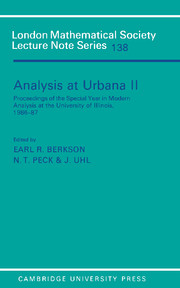Book contents
- Frontmatter
- Contents
- Acknowledgements
- PREFACE
- The C1contractions
- Factorization theorems for integrable functions
- Spectral decompositions and vector-valued transference
- Vector-valued Hardy spaces from operator theory
- Restricted invertibility of matrices and applications
- The commuting B.A.P. for Banach spaces
- The minimal normal extension of a function of a subnormal operator
- Two C*-algebra inequalities
- The generalised Bochner theorem in algebraic scattering systems
- Differential estimates and commutators in interpolation theory
- A survey of nest algebras
- Some notes on non-commutative analysis
- Some remarks on interpolation of families of quasi-Banach spaces
- An application of Edgar's ordering of Banach spaces
- Martingale proofs of a general integral representation theorem
Some notes on non-commutative analysis
Published online by Cambridge University Press: 05 September 2013
- Frontmatter
- Contents
- Acknowledgements
- PREFACE
- The C1contractions
- Factorization theorems for integrable functions
- Spectral decompositions and vector-valued transference
- Vector-valued Hardy spaces from operator theory
- Restricted invertibility of matrices and applications
- The commuting B.A.P. for Banach spaces
- The minimal normal extension of a function of a subnormal operator
- Two C*-algebra inequalities
- The generalised Bochner theorem in algebraic scattering systems
- Differential estimates and commutators in interpolation theory
- A survey of nest algebras
- Some notes on non-commutative analysis
- Some remarks on interpolation of families of quasi-Banach spaces
- An application of Edgar's ordering of Banach spaces
- Martingale proofs of a general integral representation theorem
Summary
Abstract.
An unbounded non-commutative monotone convergence result (Theorem 9) is proved. A new derivation of the Friedrichs extension is given. The basics of the Takesaki cones are studied.
1. Introduction.
We study certain aspects of the theory of von Neumann algebras that emphasize its interpretation as non-commutative measure theory. In this interpretation, which is direct and unmistakable, the projections in the algebra are the characteristic functions of the (non-commuting) measurable sets (which do not appear!), the elements of R are the bounded measurable functions, and the (normal) states of R are the probability measures on the underlying (non-commutative) measure space (which, again, does not appear). An important result, in the early stages of the theory, states that if {An} is a monotone increasing sequence of self-adjoint operators, bounded above (by some multiple of the identity operator I), then there is a bounded self-adjoint operator A such that Anx → Ax for each x in the underlying Hilbert space. If each An ∊ R then, of course, A ∊ R (cf. [6; Lemma 5.1.4]). This is a primitive non-commutative monotone convergence theorem. In Section 3, the restriction that the sequence {An} be bounded above is removed; the limit A is now an appropriate unbounded self-adjoint operator affiliated with R. (We write A η R to indicate this affiliation.) The extension of the classical bounded non-commutative monotone convergence result to this unbounded version (Theorem 9) seems not to be routine.
- Type
- Chapter
- Information
- Analysis at Urbana , pp. 243 - 257Publisher: Cambridge University PressPrint publication year: 1989



